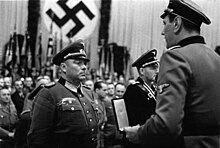Hellmut Körner
Max Otto Hellmut Körner (born February 16, 1904 in Dresden ; † February 27, 1966 in Hamburg ) was a German Reichstag member of the NSDAP and a state farmer leader in Saxony .
Life
The son of the lawyer and notary Johannes Körner and his wife Susanna Lahl attended the community school and the Realgymnasium in Dresden- Blasewitz , studied agriculture at the University of Leipzig from 1925 to 1927 and leased a property in Piskowitz near Zehren in 1928 .
Körner belonged to the Wehrwolf and was a member of the Stahlhelm from 1928 to 1929 . He joined the NSDAP at the beginning of October 1930 ( membership number 328.871) and in September 1930 he became the local group leader in Zehren.
Just a month later, he was entrusted with the district office for agriculture in the Meissen district . In February 1931 he became the NSDAP's agricultural district advisor in the Saxony district . In July 1932 he received a Reichstag mandate for the NSDAP in the Dresden-Bautzen constituency, which he held until May 1945. After the seizure of power by the Nazis, he was State Farmers' leaders of the country's peasantry Saxony in Dresden. At the beginning of June 1934 he became a member of the SS (membership number 227.544) and from May 1936 worked in the race and settlement main office of the SS. In the same year he acquired a hereditary farm (see Reichserbhofgesetz ) in Dahlen (Saxony) and was appointed head of the administration office of the Reichsbauernführer in Berlin the following year .
In October 1939, soon after the outbreak of World War II , he became head of the Food and Agriculture Department of the General Government in Krakow . This function, in which he was appointed SS-Brigadführer on May 4, 1941 , he exercised until the beginning of the attack on the Soviet Union in June 1941, when he became Deputy Chief of War Administration and head of the Chief Agriculture Group at the Economic Inspectorate South. After the formation of the Reichskommissariat Ukraine he became head of the main department for food and agriculture in Rovno . At the same time, Körner presided over the board of directors of Landbewirtschaftungsgesellschaft Ukraine (LBGU). At the height of his career, on November 9, 1944, he took over a position in the SS Race and Settlement Main Office .
After the end of the war, Körner was an authorized signatory in Hamburg.
Awards (selection)
- Golden party badge of the NSDAP on January 30, 1939
- Knight's Cross of the War Merit Cross with Swords on October 3, 1943
- Honorary sword of the Reichsführer SS
- SS skull ring
Works
- Paths to Achievement in the Generation Battle. Berlin: Reichsnährstand 1938 (co-author: Georg Claus).
- Between the Warthegau and the USSR. Berlin: Reichsnährstand 1941.
literature
- Fritz Deubner : The Erzgebirge ancestors of our country farmer's guide . In: Illustrated Erzgebirgisches Sonntagsblatt No. 35 of August 27, 1939.
- Herbert Wünsch: The ancestors of German peasant leaders, Vol. 23 (Hellmut Körner), Reichsnährstand Verlags-Ges., 1936.
- Erich Stockhorst: 5000 people. Who was what in the 3rd Reich . Arndt, Kiel 2000, ISBN 3-88741-116-1 (unchanged reprint of the first edition from 1967).
- Ernst Klee : The dictionary of persons on the Third Reich . Who was what before and after 1945 . 2nd Edition. Fischer-Taschenbuch-Verlag, Frankfurt am Main 2007, ISBN 978-3-596-16048-8 .
- Werner Präg / Wolfgang Jacobmeyer (eds.): The service diary of the German Governor General in Poland 1939–1945 . Publications of the Institute for Contemporary History , Sources and Representations on Contemporary History Volume 20, Stuttgart 1975, ISBN 3-421-01700-X .
Web links
- Literature by and about Hellmut Körner in the catalog of the German National Library
- Hellmut Körner in the database of members of the Reichstag
- Short biography
Individual evidence
- ^ The German Leader Lexicon . Verlag Otto Stollberg, Berlin 1934, p. 247.
- ↑ a b c Werner Präg / Wolfgang Jacobmeyer (Ed.): The service diary of the German Governor General in Poland 1939–1945 , Stuttgart 1975, p. 949.
- ↑ Erich Stockhorst : 5000 heads. Who was what in the 3rd Reich . 2nd Edition. Arndt, Kiel 2000, ISBN 3-88741-116-1 , p. 243.
- ↑ "Achievement of Maximum Yields - Die Landbewirtschaftungsgesellschaft Ukraine", in: Deutsche Zeitung in the Netherlands, March 12, 1943, p. "Economy and Labor", p. 6 of the PDF file, https://resolver.kb.nl/ resolve? urn = ddd: 011239334: mpeg21: pdf # page = 6 .
- ^ Ernst Klee : The dictionary of persons on the Third Reich. Who was what before and after 1945 . Fischer Taschenbuch Verlag, Second updated edition, Frankfurt am Main 2005, p. 326.
- ^ Klaus D. Patzwall : The Golden Party Badge and its honorary awards 1934-1944 . Patzwall, Norderstedt 2004, ISBN 3-931533-50-6 . P. 75.
- ↑ Bundesarchiv Bilddatenbank, legend to signature: »Bild 183-J08001«, https://www.bild.bundesarchiv.de/archives/barchpic/search/_1550913061/
| personal data | |
|---|---|
| SURNAME | Körner, Hellmut |
| ALTERNATIVE NAMES | Koerner, Max Otto Hellmut |
| BRIEF DESCRIPTION | German politician (NSDAP), MdR, country farmer leader |
| DATE OF BIRTH | February 16, 1904 |
| PLACE OF BIRTH | Dresden |
| DATE OF DEATH | February 27, 1966 |
| Place of death | Hamburg |

